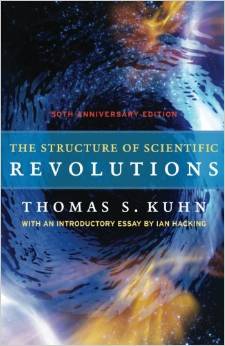
The Structure of Scientific Revolutions
Thomas S. Kuhn, pub. 1962 (University of Chicago Press: Dec 15, 1996) 226 pages.There’s a "Frank & Ernest" comic strip showing a chick breaking out of its shell, looking around, and saying, "Oh, wow! Paradigm shift!" Blame the late Thomas Kuhn. Few indeed are the philosophers or historians influential enough to make it into the funny papers, but Kuhn is one. The Structure of Scientific Revolutions is indeed a paradigmatic work in the history of science. Kuhn’s use of terms such as "paradigm shift" and "normal science," his ideas of how scientists move from disdain through doubt to acceptance of a new theory, his stress on social and psychological factors in science — all have had profound effects on historians, scientists, philosophers, critics, writers, business gurus, and even the cartoonist in the street. Some scientists (such as Steven Weinberg and Ernst Mayr) are profoundly irritated by Kuhn, especially by the doubts he casts — or the way his work has been used to cast doubt–on the idea of scientific progress. Yet it has been said that the acceptance of plate tectonics in the 1960s, for instance, was sped by geologists’ reluctance to be on the downside of a paradigm shift. Even Weinberg has said that "Structure has had a wider influence than any other book on the history of science." As one of Kuhn’s obituaries noted, "We all live in a post-Kuhnian age." ~ Mary Ellen Curtin of Amazon.com